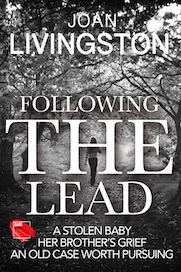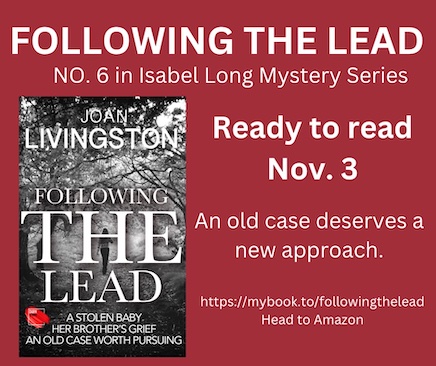One constant in my Isabel Long Mystery Series is that each book has a bar. Make that two in Missing the Deadline, the seventh, which has Dec. 21 release.
The fictional hilltowns of Western Massachusetts are the setting for this series. I am talking about towns that have a thousand people or so. Many are a one-store, one-school, and one-church kind of town. Some might even have one bar, and for those that do, it is often a gathering spot for the locals. That’s certainly true in Conwell, where Isabel Long, the series’ protagonist, lives.
Jack Smith owns the Rooster Bar and Grille, and Isabel pours beer and the occasional mixed drink or cheap wine from a box on Friday nights when a band plays. She and Jack have a relationship, which makes for some interesting interaction since he’s a local guy and she’s a newcomer.
And the Rooster’s customers, especially those Isabel calls the True Blue Regulars, are often great sources for the cold cases she’s taken on as a private investigator. Keen-eyed Isabel also observes the romances, lasting or not, that happen at the Rooster. My lips are sealed but Missing the Deadline has one of the most unlikely romantic hookups that starts at the Rooster.
Jack Smith runs a friendly bar, but do something stupid and you’re out for six months. Do it again, and you might be banned forever. It took an intervention from Isabel to allow the Beaumont brothers back in, but then again, they did come to her rescue in a couple of her cases.
Baxter’s is another bar in my series. It’s more of a biker bar, and Dave Baxter, the owner, isn’t so particular about who drinks there. In fact, many of the people who got kicked out of the Rooster are customers. Isabel will visit Dave because he knows what’s going on in the town of Caulfield and beyond. Sometimes she meets people of interest there. It’s a little tricky because Dancin’ Dave, his secret nickname, obviously has the hots for Isabel, but the feeling isn’t reciprocal.
One other bar has appeared in my series, Red’s Corner Lounge, in Dillard. This is a seedy little joint that was the setting for a pivotal scene in Killing the Story, the fourth in the series. The way the eighth book is going, I imagine Isabel will be making another visit there.
My hilltown books that are not part of the series have their own bars; The Sweet Spot; The Sacred Dog, which is actually the name of a bar, inspired by the owner’s loyal pet; and Northern Comfort.
One of the fun parts about writing this series is coming up with the band names. Here’s a sampling: Junkyard Dogs, The Plowboys (all highway workers), and Country Bumpkins. Their genres as you might imagine are country, rock and maybe a little bit of blues.
I’m not a big drinker — one good craft beer will do it for me. But I’ve enjoyed the time I’ve spent in bars, raising a glass or bottle, and dancing with Hank when there’s a band. And bars are great place to people watch, a definite hobby of mine, and have conversations with people you barely know.
I actually dedicated one of the books in the series, Working the Beat, to the former owners of a country bar in the hilltown where we once lived that has definitely been an inspiration.
And I feel fortunate our son, Zack, has created Floodwater Brewing in Shelburne Falls, the village where we live in Western Massachusetts. That’s a glass of one of his hand-crafted beers in the photo above.
Here’s a scene from Missing the Deadline. Isabel shows up on a Thursday night. Fred is Jack’s often annoying cousin who Isabel has dubbed ‘el Creepo’ for past misdeeds.
Jack greets me with a “Here’s my gal” as I walk through the front door of the Rooster. I don’t normally come Thursday nights. It’s typically quiet, so my services behind the bar are not needed. Burgers and fries are solely what’s on the menu. The only music comes from the jukebox, currently playing Toby Keith’s “I Love This Bar,” which could be a theme song for many of the drinkers here tonight. Although most have another workday tomorrow, they’re getting a jumpstart on the weekend, playing pool or just hanging around drinking and yakking about what’s going on in their lives or somebody else’s. As I’ve mentioned before, gossip is the biggest pastime in this town. The television in that part of the room broadcasts a baseball game with the sound off, but nobody is paying much attention since the Red Sox aren’t playing.
I take a stool opposite Jack, who places a cold draft in front of me.
“You can put it on my tab,” I joke.
“I believe it’s time to make you pay up, Isabel,” he says, winking.
Jack’s cousin, Fred aka el Creepo, who sits four stools down, groans. He and I are the only ones at the counter. Fred’s got the best seat in the house, the one where you can rest your back against the wall that’s shared by the men’s room. Of course, the sitter is privy to whatever is going on there, which can be entertaining or disgusting. Maybe someday I’ll time how long the men in there take to drain a bladder full of beer and make a score board. I’m only kidding.
“I don’t know how much of this I can put up with,” Fred says.
I take a drink before I dish back a comment.
“Where’s that gal of yours tonight? She dump you already?”
“Funny, Isabel. Very funny. Nah, she had to do somethin’ with her mother tonight. Things are just fine between us.”
“Glad to hear,” I tell him.
BOOK NEWS: Missing the Deadline has a Dec. 21 release on Kindle. Price? $3.99. Paperback readers will have to be a little patient.







